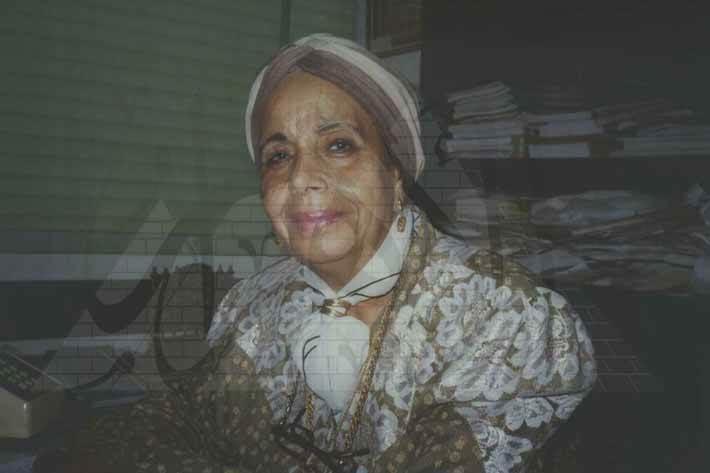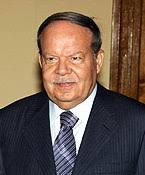The picture is courtesy of Al-Ahram.
Wednesday 9 November marked the arbaeen of an icon of Egyptian feminism and activism, Nemat Ahmed Fouad (1926 – 2016). Arbaeen is literal for 40, and denotes 40 days on the death of a person. It was honoured in ancient Egypt where it marked an important landmark in the process of mummification. To this day Egyptians keep the tradition of commemorating the arbaeen of a person who has passed away. Watani seizes the occasion to pay tribute to a singular woman
On Saturday 1 October, the Egyptian writer and intellectual Nemat Ahmed Fouad passed away in Cairo after a long struggle with illness. Ms Fouad was 90 years old. She is survived by her husband Ahmed Taher, her daughter Hanan and son Ahmed Fouad, and five grandchildren; she survived her second daughter Finan who had been on the staff of Cairo University’s Faculty of Political Sciences.
Exceptional
Nemat, pronounced Neimaat, was born in the town of Maghagha in Minya, some 250km south of Cairo, to a well-to-do family, her father was a trader. As a schoolgirl, Nemat showed exceptional talent at reading and learning and at creative, expressive writing. So much so that, during an era when girls’ education would normally conclude at the end of the primary stage after which they would get married, her father resisted his own father’s wish to marry off Nemat, and sent her to boarding school in Cairo. Nemat would never forget his absolute support and encouragement, also the encouragement of her schoolteacher Ahmed Attiya who discovered her talent when as a 10-year-old she wrote 12 pages to describe a school trip to a sugar refinery. During her boarding school days Nemat would spend her winter months at school where another Arabic Language teacher, Muhammad al-Houfi, again helped cultivate her gift for writing, and her summer months at home where her father would provide her with invaluable books to read. Nemat would later fondly recall those days; her school friend was Amal Fahmy (b. 1926) who grew to be an iconic radio hostess on Egypt Radio. Amal would ask Nemat to help her with writing assignments, and Nemat would ask Amal who had a beautiful, sensitive voice to sing some of their favourite songs.
Overflow of the spirit
Arabic Literature seemed the natural choice for Nemat to study in university. After obtaining her BA she went on to earn a masters then a doctoral degree. The subject of her dissertation was on “The Nile in Arabic literature”, which she prepared by touring Egypt’s towns and villages far and wide, and through which she proved how intricately linked the Nile is to Egyptian culture and daily-life aspects. That was during the early 1960s.
During the 1950s Nemat met the man who became her lifelong partner and husband, Muhammad Taher who was both in the businesses of pharmaceuticals and publishing. Mr Taher says he found in her an exceptionally gifted person, and thus insisted she would not waste her energy on traditional arduous housework but should be allowed the time for creativity. They had maids to cook and wash and help around the house, and Nemat was free to make better use of her time. Her husband would occasionally surprise her with gifts of rare books, among them copies from French-language limited editions, that took her to the seventh heaven of delight. The calm and ease which filled her life gave her ample time for literary endeavour; these flourished and yielded over 60 books and countless articles throughout her lifetime, including a weekly column at the Cairo topmost daily al-Ahram. Among her best-known titles are Shakhsiyat Misr (The Personality of Egypt). Her writing was no mere words; it was an overflow of spirit and emotions.
Life taught me…
Perhaps her most famous and widely-read book has been Ilabnaty (To My Daughter) which won the UNESCO prize in 1964 as one of the best ten books worldwide written on Motherhood. Amazon posts this commentary on the book: “After four decades, the book is more relevant than ever…[offering] surprisingly fresh thoughts and timeless values…”
There is a story behind Ilabnaty (To My Daughter). Nemat began writing it in
1955 when close to giving birth to her first child. Her first words were contemplations on her unborn baby and her surge of motherhood passion. Once she had given birth to a daughter, Hanan, she asked for pen and paper and proceeded with the overflow of warm emotions. At later intervals she would jot down her views on such issues as women and womanhood, friendship, the value of money, culture, marriage, and the meaning of faith and religion. The book was printed in 1984, by which time she had had her second daughter Finan, and her son Ahmed Fouad.
Among the book’s most striking entries is one on faith: “Life has taught me that faith is a safe haven where the human soul rests, carrying all its dreams, fears, and delusions. Nothing gives man comfort as his connection to God.” Another entry on money says: “Winning a thousand-pounds lottery is pleasant. But easy money goes away as easily as it came…Nothing compares to heard-earned, sweat-drenched money full of blessings.” Nemat addresses the Egyptian fellaha (peasant woman) with: “To her whose nature blended with that of our valley and gained its imprint, so that she now carries in her meagre frame the goodness of the earth, the charm of the sky, and the endless patience of the desert…”
Tough battles
When her rich collection of books exceeded a staggering 40,000 in number, Dr Fouad came up with the brilliant idea of housing them in a special library. She built the Dr Nemat Ahmed Fouad Library off the Pyramids Road in Giza on land owned by her husband. The library is composed of two main volumes, a star-shaped main building and an octagonal lecture hall surrounded by a landscaped patio and terrace. It is constructed of narrow bands of rough-hewn limestone, and has been placed on the list of the Aga Khan Trust for Culture. It includes 40,000 volumes of various topics and is open to researchers and scholars.
Nemat Ahmed Fouad was not only a literary icon, she was also an activist in the true sense of the word. She waged public campaigns against projects which threatened Egypt’s heritage or public interest. In 1995, she waged a campaign against the Culture Ministry and filed a lawsuit against the minister on account of a project to build a resort on the desert plateau of the Giza pyramids. “The ministry is building shops and toilets and planting trees on ancient soil,” she said in court documents. “Egyptologists have confirmed there are archaeological remains under these sands and it is illegal to build on them.” She won the lawsuit and it is thanks to her that the area around the pyramids today still retains its original character.
Other campaigns Dr Fouad conducted and won were against tampering with the character of other ancient Egyptian and Islamic antiquity sites, also a battle to stop authorities from accepting an international offer to bury nuclear waste in Egypt. She lost, however, an attempt to stop Egypt from holding overseas exhibitions of Egyptian antiquities.
“I rose above dazzling temptations”
At various times of her life Dr Fouad taught at universities inside and outside Egypt. She held the posts of General Manager of the Supreme Council of Culture in Cairo, and Head of the Society for Preservation of Heritage and Antiquity.
In 2009, Egypt awarded her with the Appreciation Prize for Social Sciences.
A memorable quote attributed to her, in all probability referring to her relentless battle to save the Pyramids Plateau, says: “It is great that a person should possess a pen and opinion, but it is even more precious that he or she should adopt a firm stance vis-à-vis causes they believe in. I have been blessed with the capacities of expression and decisiveness; I was able to take difficult decisions regarding worthwhile causes; for this I endured much and rose above dazzling offers and temptations. Much more worthwhile for me was the soil of this land, every particle of this soil.”
Watani International
9 November 2016
















